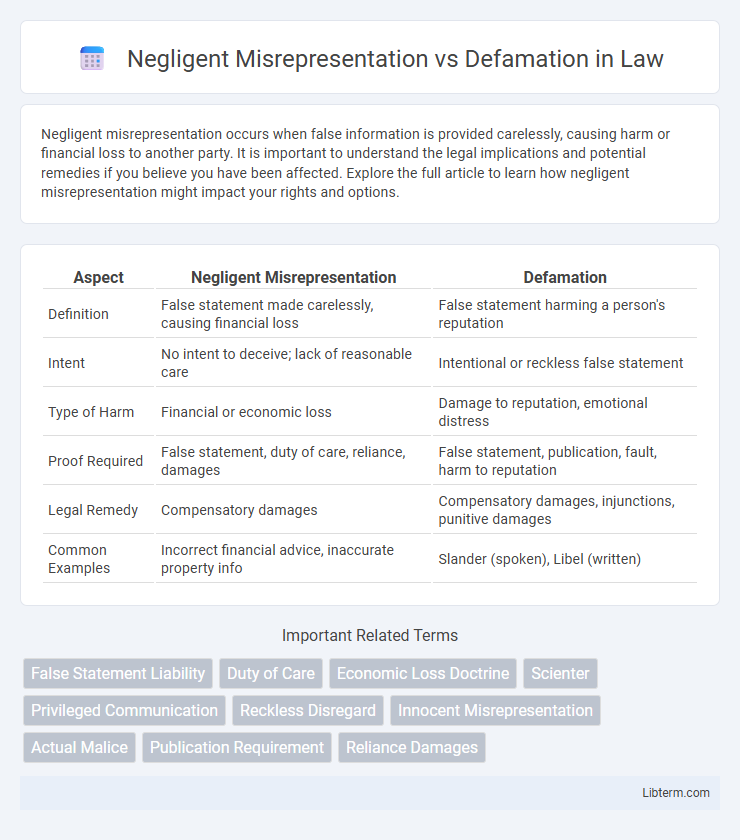Negligent misrepresentation occurs when false information is provided carelessly, causing harm or financial loss to another party. It is important to understand the legal implications and potential remedies if you believe you have been affected. Explore the full article to learn how negligent misrepresentation might impact your rights and options.
Table of Comparison
| Aspect | Negligent Misrepresentation | Defamation |
|---|---|---|
| Definition | False statement made carelessly, causing financial loss | False statement harming a person's reputation |
| Intent | No intent to deceive; lack of reasonable care | Intentional or reckless false statement |
| Type of Harm | Financial or economic loss | Damage to reputation, emotional distress |
| Proof Required | False statement, duty of care, reliance, damages | False statement, publication, fault, harm to reputation |
| Legal Remedy | Compensatory damages | Compensatory damages, injunctions, punitive damages |
| Common Examples | Incorrect financial advice, inaccurate property info | Slander (spoken), Libel (written) |
Understanding Negligent Misrepresentation
Negligent misrepresentation occurs when a false statement is made carelessly or without reasonable grounds for believing its truth, causing financial harm to another party. Unlike defamation, which involves damaging someone's reputation through false statements, negligent misrepresentation centers on economic loss resulting from misinformation in business or contractual contexts. Key elements include duty of care, breach, reliance on the false statement, and resulting damages.
Defining Defamation: Key Concepts
Defamation involves making false statements about an individual or entity that harm their reputation, categorized as either libel (written) or slander (spoken). Key concepts include the false statement, publication to a third party, and resulting damage to the subject's reputation. Unlike negligent misrepresentation, defamation centers on protecting personal or business reputations rather than financial or contractual interests.
Elements Required for Negligent Misrepresentation
Negligent misrepresentation requires the presence of a false statement made carelessly by the defendant, reliance on that statement by the plaintiff, and resulting economic harm. The defendant must have owed a duty of care to the plaintiff to provide accurate information but failed in this duty through negligence. Unlike defamation, which involves false statements harming reputation, negligent misrepresentation centers on misinformation causing financial loss.
Legal Components of Defamation
Defamation involves the communication of a false statement that injures a person's reputation, requiring proof of publication, falsity, fault, and damages as essential legal components. Negligent misrepresentation centers on providing false information without reasonable care, primarily causing financial loss rather than reputational harm. Understanding defamation's core elements includes identifying the defamatory statement, proving it was made to a third party, establishing the statement's falseness, and demonstrating actual damage to the subject's reputation.
Core Differences Between Negligent Misrepresentation and Defamation
Negligent misrepresentation involves providing false information carelessly without verifying its accuracy, resulting in economic harm to the plaintiff. Defamation requires the publication of a false statement that damages a person's reputation, with the key element being harm to reputation rather than financial loss. The core difference lies in the nature of the harm--negligent misrepresentation causes economic damage due to inaccurate information, while defamation causes reputational damage through false statements.
Burden of Proof in Negligent Misrepresentation vs Defamation
The burden of proof in negligent misrepresentation requires the plaintiff to demonstrate that the defendant made a false statement without reasonable care, which caused financial loss. In defamation cases, the plaintiff must prove the statement was false, published to a third party, and caused reputational harm or damages. Unlike defamation, negligent misrepresentation focuses on the defendant's duty of care and the resulting economic damages rather than harm to reputation.
Examples of Negligent Misrepresentation Cases
Negligent misrepresentation occurs when false information is carelessly communicated, leading to financial loss, such as a real estate agent providing inaccurate property details causing a buyer to overpay. Defamation involves false statements harming a person's reputation, exemplified by publishing untrue accusations that damage a professional's credibility. Notable negligent misrepresentation cases include *Hedley Byrne & Co Ltd v Heller & Partners Ltd*, where careless financial advice resulted in significant client losses.
Notable Defamation Cases and Precedents
Notable defamation cases such as New York Times Co. v. Sullivan (1964) established that public figures must prove "actual malice" to succeed in defamation claims, shaping the legal standard distinct from negligent misrepresentation, which centers on false statements causing financial harm without intent. In contrast, negligent misrepresentation cases rely on proving a duty of care and breach resulting in economic loss, exemplified by Restatement (Second) of Torts SS 552. Defamation precedents emphasize protecting free speech while balancing reputational harm, whereas negligent misrepresentation focuses on economic damages from carelessly conveyed misinformation.
Defenses Against Claims: Negligent Misrepresentation and Defamation
Defenses against negligent misrepresentation claims often include proving the absence of reasonable reliance or lack of duty owed by the defendant to the plaintiff, while in defamation cases, defenses typically involve demonstrating the truth of the statement, privilege immunity, or that the statement was an opinion rather than a factual assertion. Negligent misrepresentation defenses hinge on disproving negligence or causation, whereas defamation defenses emphasize protecting free speech and balancing reputational interests. Understanding the nuanced differences in these defenses is crucial for effectively navigating legal disputes involving false statements.
Practical Implications for Businesses and Individuals
Negligent misrepresentation involves providing false information without reasonable care, leading to financial loss, while defamation concerns damaging someone's reputation through false statements. Businesses face lawsuits and reputational harm in negligent misrepresentation cases, emphasizing the need for accurate disclosures and due diligence. Individuals must carefully verify claims before publicizing statements to avoid defamation suits, highlighting the importance of clear communication and factual accuracy.
Negligent Misrepresentation Infographic

 libterm.com
libterm.com